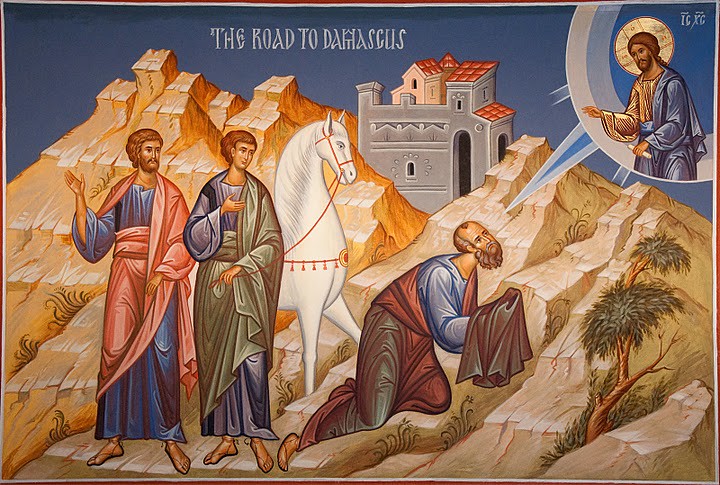Easter 3C
St Luke’s Church, Mosman
5 May 2019
Greetings from Christ Church Cathedral in Grafton, it is good to be here with you this morning and to sense the bonds of faith and liturgy that we share as Anglicans across time and place.
Greetings also from the Episcopal Diocese of Jerusalem and the Middle East. As a Canon emeritus of St George’s Cathedral in Jerusalem and a former Dean of the College there, it is always my privilege to bring greetings from our sisters and brothers in the Holy Land.
On the road to Damascus
For the past couple of weeks we have been parsing the early Easter experience of those people who found themselves picking up the pieces after Good Friday, and trying to make sense of the weird rumours that the one who had certainly been dead was somehow alive, with God and yet also with them.
We find it hard to make sense of those stories after 2,000 years, but imagine how hard it must have been for the small group of people who did not abandon their hope that God was in Christ reconciling the world to himself, even though many of them had failed Jesus at his most critical time.
For them there was no long tradition of Christian faith and practice to look back upon and from which to draw some credible basis for faith.
Like the dedicated branch members in Isaacs, Lyons and Melbourne and Wills, those first disciples saw their hopes and dreams evaporate. Then the rumours started. There was no social media, but word was passing from one person to another that Jesus was not dead after all.
Not exactly back to his old self, so to speak.
Not walking the dusty roads of Palestine, teaching the crowds and healing the sick.
But spotted here and there, and most often when his disciples gathered to break the bread and to seek strength from God for the world-transforming work to which God had called both Jesus and them.
Instead of dispersing after the death of Jesus, his followers were hanging together and even growing in numbers.
Like the broomstick in the Sorcerer’s Apprentice, the problem seemed to be getting worse with every attempt to deal with the ‘problem’ of the Jesus people.
The authorities began to arrest and kill the followers of Jesus, but they just seemed to multiply.
No longer limited to a few villages in Galilee and a handful of houses in Jerusalem, this sect was now to be found in many parts of the country and was even spreading to regional cities like Antioch and Damascus.
A plan emerges: send young Saul to Damascus with letters of authority to arrest these crazy people and drag them back to Jerusalem for punishment. This nonsense must be stopped.
Another broken broomstick …
Saul will become Paul, the greatest and most influential follower of Jesus that the world has ever seen.
Our first reading in today’s lectionary is the classic tale from Acts 9 of Saul’s “Damascus road” experience as he encounters the risen Lord: Acts 9:1-6.
This is the first of three versions of the call/conversion of Saul/Paul in Acts, and they each tell the story a wee bit differently: chapters 9, 22 and 26.
These variations form part of the narrative art of the author of Luke-Acts, and it is not clear that Paul would have agreed with the ways in which his own “Easter moment” was being portrayed. He was adamant that his ‘gospel’ came direct from God and without any human third parties involved. Acts gets there by the third iteration, but along the way portrays Paul as being nurtured by local runaway Christians in Damascus as he makes sense of his own encounter with the risen Lord.
We have Paul’s own account in his own words in his letter to the Galatians, a region in southern Turkey. This may be the first piece of Christian literature to have survived and is commonly described as the first of Paul’s letters. It may be dated to 49/50 CE, just 20 years after Easter.
You have heard, no doubt, of my earlier life in Judaism. I was violently persecuting the church of God and was trying to destroy it. I advanced in Judaism beyond many among my people of the same age, for I was far more zealous for the traditions of my ancestors. But when God, who had set me apart before I was born and called me through his grace, was pleased to reveal his Son to me, so that I might proclaim him among the Gentiles, I did not confer with any human being, nor did I go up to Jerusalem to those who were already apostles before me, but I went away at once into Arabia, and afterwards I returned to Damascus. (Galatians 1:13–17 NRSV)
Can you imagine a church without Paul?
It seems that God could not, and for sure the church we now are is deeply indebted to this mercurial figure who was not a follower of Jesus and yet became the most influential of the Apostles.
The story of Paul encapsulates the Easter miracle, so we can be glad that the lectionary committee has chosen the passage from Acts 9 for us to reflect upon today.
Of course, as we rejoice in the legacy of Paul, we are reminded that God may be waiting to ambush us—or our church.
The God of Easter, the God who raised Jesus from the dead, the God who called Paul to serve as the greatest exponent of Christ is also the God calls us to live bravely into the future rather than defend the past.
A disturbing God.
The God of Easter.

Do leave a reply. I always appreciate hearing from my readers/Cancel reply